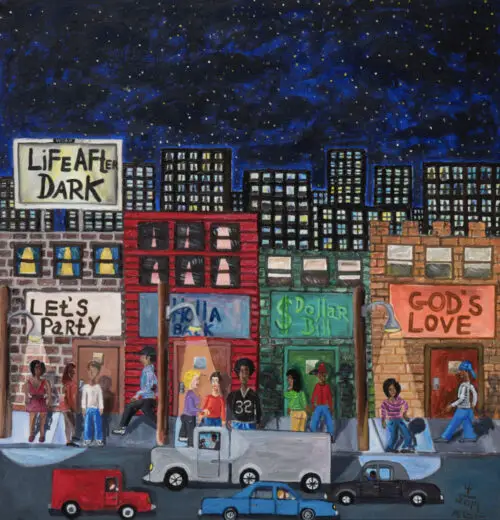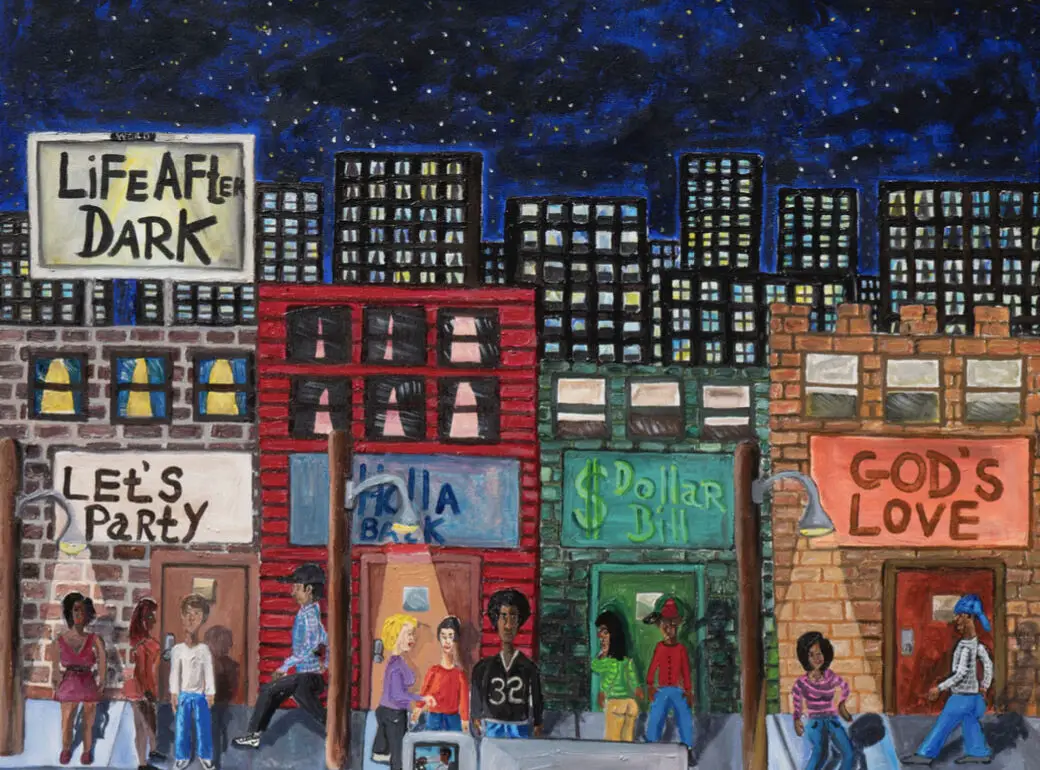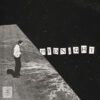
Beginning February 1, 2024, Fort Gansevoort will present Cleveland by Night, its second exhibition devoted to the work of late artist Michelangelo Lovelace (1960-2021). On view will be paintings and drawings depicting nocturnal city life in Cleveland, Ohio—exterior and interior tableaux capturing the city where he was born and lived for all of his sixty years.
Best known for urban genre scenes set within sprawling cityscapes, Lovelace attracted critical praise in his lifetime for intimate depictions of Cleveland’s Black community and its built world. His subject matter explores topics of policing, poverty, war, and healthcare, all replete with deep personal expressions of Black identity and shaped by his immersion in art as an antidote to the effects of poverty and addiction. Through a rich color palette and a distinctive, even eccentric, approach to spatial perspective, Lovelace’s art imbued his subjects with immediacy and relatability, beckoning the viewer to join him in examining the struggles of urban communities as well as their resilience and vibrancy.
Spanning the years from 1998 to 2020, the works on view at Fort Gansevoort elucidate the mysterious and animating qualities of the night as synthesized by Lovelace. While for most people evening is a moment for rest, leisure, or amusement, for Lovelace the wee hours were a critical time for creative productivity and contemplation. As he once stated, “It dawned on me that we tend to be different people at night. One particular time while I was working, some friends were saying to me ‘You don’t come out at night and hang out with us anymore, what’s wrong’? and I told them I was working on my career. I started thinking that I should change it up and come out at nighttime, so now I come out at night through my paintings.”
On view in the exhibition, The Boogie Nights (2003) exemplifies the artist’s early engagement with Cleveland’s literal and psychological nocturnal topography. Similar in format to his paintings of the city’s paved intersections in the daytime, this canvas combines multiple perspectives within a single composition. Above the painting’s elevated horizon line, a narrow strip of a twinkling night sky hovers over a row of illuminated buildings. Rooftops and long streets dotted with lights are presented from an elevated perspective, while billboards and commercial signage are rendered at eye-level with texts that identify bars, strip clubs, liquor stores, pawn shops, and churches, to better emphasize the very specificity of this sparsely populated place in the dark. An advertisement for condoms and HIV/AIDS prevention injects an overt element of social commentary—or societal conscience—and locates the painting in the time of its making. Evocative of a buzzing urban nightlife (and its sometimes-seedy realities), the title of the work echoes the pastiche of the painted environment and nods to the 1970s funk era party anthem of the same name by the Ohio-born hit-making band Heatwave.
Lovelace produced a series of paintings just prior to and during the first grave year of the global COVID-19 pandemic. These works documented an expanded perspective of Cleveland at night in a period of particular psychological gloom. Leveraging contrast as a formal conceit, these paintings feature clandestine figures moving through the shadows while dramatic pin-spots from streetlamps point to the gulf between lightness and darkness. As Lovelace described, “I wanted to use light as a spotlight by lighting individual subjects, working with light and dark in a way that would illuminate the feeling you cannot see.” This feeling that cannot be seen also resonates in reference to Michelangelo’s own diagnosis with pancreatic cancer, an illness that tragically took his life in 2021. Social Distancing (2020), one of Lovelace’s final night paintings, was created at the height of the pandemic and shortly before the artist’s passing. It addresses the physical and emotional experience of human isolation. Dark clouds ominously gather above the buildings in place of the starry skies seen in earlier related views of the city at night. In this somber iteration of his nocturnal theme, Lovelace offers up masked subjects who stand apart from each other while a police car patrols the streets and storefronts display “CLOSED” signs. Though Lovelace used Cleveland as his visual dictionary, his rendering of its specifics was such that these night scenes acquire universality: they could have come from any number of cities across the globe during the pandemic.
In counterpoint to these exterior views, the exhibition at Fort Gansevoort also includes a group of works depicting interior scenes of nocturnal activities both communal and solitary, from intimate exchanges to boisterous group scenes. In Doing the Casper Slide (2014), Gangs All Here (2014), and Color Count (2001), the viewer is given windows into the party culture of Cleveland’s bars and clubs, with DJs spinning sets, crowds dancing, and rowdy friends letting loose.
Along with the party scenes, in other intimate paintings, Lovelace has offered up his personal story—one colored by his addictions to alcohol, drugs, and sex, which produced highs only surpassed by his own artistic fervor: in spite of the many challenges he endured, Lovelace pursued his artistic career with unequivocal devotion. Holding various day jobs to support himself and his family, he cherished the night as a precious time for concentration and artistic production. As Lovelace often noted, painting functioned as his salvation from the systemic cycles of addiction, violence, and poverty that shaped his lived experience and that of those around him—a mechanism in his refusal to allow those things to define or limit him.
Will you be checking this one out?




